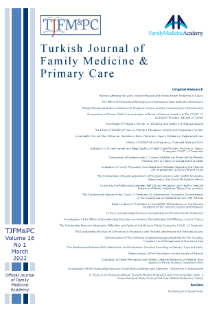Aile Hekimlerinde Korona Virüs Salgını Nedeniyle Yaşanılan Zorluklar, Kaygı ve Tükenmişlik Durumlarının İncelenmesi
Examination Of Challenges, Anxiety and Burnout Among Family Physicians Due To Corona Virus Outbreak
___
- 1. Kroenke K, Spitzer RL, Williams JB, Löwe B. An ultra-brief screening scale for anxiety and depression: the PHQ–4. Psychosomatics 2009; 50(6): 613-621
- 2. Demirci, İ, Ekşi H. Don't bother your pretty little head otherwise you can‟t enjoy life. ERPA International Congresses on Education 2018, 28 June -1 July 2018, Istanbul / Turkey. pg. 287-292
- 3. Maslach C, Jackson SE. The measurement of experienced burnout. Journal of Occupational Behavior, 1981; 2: 99-113
- 4. Ergin C. Doktor ve hemşirelerde tükenmişlik ve Maslach tükenmişlik ölçeğinin uyarlanması. VII. Ulusal Psikoloji Kongresi Bilimsel Çalışmaları. Hacettepe Üniversitesi, Ankara, s.143- 153
- 5. Çapri B. Tükenmişlik ölçeğinin Türkçe uyarlaması. Mersin Üniversitesi Eğitim Fakültesi Dergisi 2006; 12: 62-77
- 6. Kumar R, Naseem S, Jayatissa J, Adhikari CL, Aziz T, Qureshi R et al. A Statement of Solidarity on COVID‑ 19 Pandemic 2020
- bythe South Asian Family Physicians. Journal of Family Medicine and Primary Care; 2020;9 (4): 1795-97
- 7. ShanzhuZhu, Donald Li. Sharing experience from Chinese General Practitioners to International colleagues on how to tackle COVID-19. Journal of Asia Pacific Family Medicine, 2019; 18;1. https://doi.org/10.22146/apfm.v18i1.217
- 8. Rohilla J, Tak P, Jhanwar S, Hasan S. Primary care physician's approach for mental health impact of COVID-19. J FamilyMed Prim Care. 2020 Jul; 9(7): 3189–3194.
- 9. Monterrosa-Castro A, Redondo-Mendoza V, Mercado-Lara M. Psychosocial factors associated with symptoms of generalized anxiety disorder in general practitioners during the COVID-19 pandemic. J InvestigMed2020;68:1228–1234
- 10. Amerio A, Bianchi D, Santi F, Costantini L, Odone A, Signorelli C et al. Covid-19 pandemic impact on mental health: a webbased cross-sectional survey on a sample of Italian general practitioners. Acta Biomed 2020; 91(2): 83-88 DOI: 10.23750/abm.v91i2.9619
- 11. Lee AM, Wong JG, Mc Alonan GM, Cheung V, Cheung C, Sham PC et al. Stress and psychological distress among SARS survivors 1 year after the outbreak. Can J Psychiatry2007; 52: 233-40
- 12. Wu P, Fang Y, Guan Z, Fan B, Kong J, Yao Z et al. The psychological impact of the SARS epidemic on hospital employees in China: exposure, risk perception, andaltruistic acceptance of risk. Can J Psychiatry 2009; 54:302-11
- 13. Maunder RG, Lancee WJ, Balderson KE, Bennett JP, Borgundvaag B, Evans S et al. Long-term Psychologıcal and Occupational Effects of Providing Hospital Healthcare during SARS Outbreak. Emerging Infectious Diseases; 2006; 12(12); 1924-1932
- 14. Lai J, Ma S, Wang Y, Cai Z, Hu J, Wei N et al. Factorsassociatedwithmentalhealthoutcomesam onghealthcareworkersexposedtocoronavirusdis ease 2019. JAMA Network Open. 2020; 3(3); e203976. Doi: 10.1001/jamanetworkopen.2020.3976
- 15. Morgantini LA, Naha U, Wang H, Francavilla S, Acar O, Flores JM et al. Factors Contributingto Healthcare Professional Burnout During the COVID-19 Pandemic: A Rapid Turnaround Global Survey. medRxivpreprintdoi: https://doi.org/10.1101/2020.05.17.20101915. Erişim tarihi: 19.09.2020.
- 16. Elbay RY, Kurtulmuş A, Arpacıoğlu S, Karadere E. Depression, anxiety, stress levels of physicians and associated factors in Covid- 19 pandemics. PsychiatryResearch 290 (2020) 113130. https://doi.org/10.1016/j.psychres.2020.113130
- 17. Kisely S, Warren N, McMahon L, Dalais C, Henry I, Siskind D. Occurrence, prevention, and management of the psychological effects of emerging virus outbreaks on healthcare workers: rapid review and meta-analysis. BMJ 2020; 369:m1642
- 18. Feng Z, Li Q, Zhang Y, Wu Z, Dong X, Ma H et al. The epidemiological characteristics of an outbreak of 2019 novel corona virus diseases (COVID-19)-China. Chinese Center for Disease Control and Prevention, 2020; 2: 1-10.
- 19. Damery S, Draper H, Wilson S, Greenfield S, Ives J, Parry J et al. Healthcare workers‟ perceptions of the duty to work during an influenza pandemic. J Med Ethics 2010; 36: 12–8
- 20. Imai H, Matsuishi K, Ito A, Mouri K, Kitamura N, Akimoto K et al. Factorsassociatedwithmotivationandhesitationt oworkamonghealthprofessionalsduring a public crisis: a cross sectional study of hospital workers in Japan during the pandemic (H1N1) 2009. BMC Public Health 2010; 10: 672.
- 21. Huremović D. Socialdistancing, quarantine, andisolation. In Psychiatry of Pandemics: A Mental Health Response to Infection Outbreak (ed D Huremović): Springer, 2019 85–94.
- 22. Huang JZ, Han MF, Luo TD, Ren AK, Zhou XP. Mental health survey of 230 medical staff in a tertiary infectious disease hospital for COVID-19. Chinese Journal of Industrial Hygiene and Occupational Diseases, 2020; 38(3):192-195.
- 23. Shigemura J, Ursano RJ, Morganstein JC, Kurosawa M, Benedek DM. Public responses to the novel 2019 coronavirus (2019-nCoV) in Japan: Mental health consequences and target populations. Psychiatry Clin Neurosci. 2020; 74(4): 281–282.
- 24. SongJ, Song TM, Seo DC, Jin DL, Kim JS. Social big data analysis of information spread and perceived infection risk during the 2015 Middle East Respiratory Syndrome outbreak in South Korea. Cyberpsychology, Behavior, andSocial Networking. 2017;20(1):22–29
- 25. Depoux A, Martin S, Karafillakis E, Preet R, Wilder-Smith A, Larson H. The pandemic of social media panic travels faster than the COVID-19 outbreak. Journal of Travel Medicine, 2020; 27(3):1- 2, https://doi.org/10.1093/jtm/taaa031
- ISSN: 1307-2048
- Yayın Aralığı: Yılda 4 Sayı
- Başlangıç: 2007
- Yayıncı: -
Covıd-19 Pandemisinde Aile Sağlığı Elemanları Ve Aile Hekimlerinde Anksiyete Düzeyi
Humeyra ASLANER, Ali Ramazan BENLİ, Serkan YILDIZ, Taner ŞAHİN, Mebrure Beyza GÖKÇEK, Selçuk MISTIK
Merve BİLGE, Ayşe AVCI, Mustafa KALE
ADANA ŞEHİR MERKEZİNDE GEBELERİN PREKONSEPSİYONEL BAKIM DURUMLARINININ DEĞERLENDİRİLMESİ
Saliha BARUTÇU, Sevgi ÖZCAN, Nafiz BOZDEMİR
Anxiety Level of Family Physicians and Family Health Workers in COVID-19 Pandemic
Hümeyra ASLANER, Ali Ramazan BENLİ, Serkan YILDIZ, Taner ŞAHİN, Mebrure Beyza GÖKÇEK, Selçuk MISTIK
Ortaokul Öğrencilerinde Okul Yaşam Kalitesi ve Saldırganlık Arasındaki İlişki
İlknur YILDIZ, Zeynep TEMEL MERT, Nurcan AKGÜL GÜNDOĞDU
Nazan Çakırer ÇALBAYRAM, İlknur Münevver GÖNENÇ, Sebahat ALTUNDAĞ
NADİR HASTALIĞI OLAN ÇOCUKLARIN AİLELERİNDE BAKIM YÜKÜNÜN İNCELENMESİ
Merve Deniz PAK GÜRE, Cemre PAK
ÜRİNER İNKONTİNANSIN HUZUREVİ VE EVİNDE YAŞAYAN YAŞLILARDA YAŞAM KALİTESİNE ETKİSİ
Tugba DURDU, Serdar Selçuk KÖKSAL, Hakan YAVUZER, Nurver TURFANER SİPAHİOĞLU
SÜNNET KANAMASININ KONTROLÜNDE HAFİF-ORTA BASKILI COBAN BANDAJ SARGISININ ETKİNLİĞİ
Kubilay SARIKAYA, Çağri ŞENOCAK, Fahri Erkan SADİOĞLU, Ömer Faruk BOZKURT
Adana Şehir Merkezinde Gebelerin Prekonsepsiyonel Bakım Durumlarınının Değerlendirilmesi
